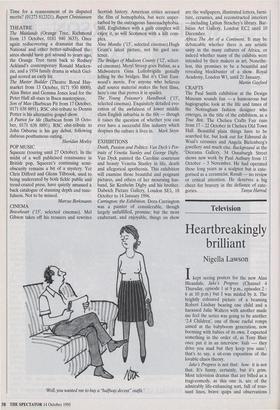Television
Heartbreakingly brilliant
Nigella Lawson
Ikept seeing posters for the new Alan Bleasdale, Jake's Progress (Channel 4 Thursday, episode 1 at 9 p.m., episodes 2 6 at 10 p.m.) but I was misled by it. The brightly coloured picture of a beaming Robert Lindsay bearing one child and a harassed Julie Walters with another made me feel the series was going to be another `2.4 Children', one of those rueful romps aimed at the babyboom generation, now booming with babies of its own. I expected something in the order of, as Tony Blair once put it in an interview: 'kids — they drive you mad but they keep you sane'; that's to say, a sit-corn exposition of the lovable chaos theory.
Jake's Progress is not that: how it is not that. It's funny, certainly, but it's grim. Most television dramas that are billed as a tragi-comedy, as this one is, are of the admirably life-enhancing sort, full of reso- nant lines, brave quips and observations you swill around in your mouth for ages after. This is bleak stuff, or would be were it not for the extraordinary pinpoint sharp- ness of the writing and the quiet conviction of the acting. Good art doesn't depress, no matter how depressing its subject matter. And this is that good: it is the best thing I've seen on television for ages. For many of you that might not seem much of a rec- ommendation. But bearing in mind a defi- nition I saw recently of the duty of the novel, 'to write more convincingly about the human condition than you can almost bear to read', I'd say that this is better than most things I've read recently, too.
Jake's Progress seems to have been seized upon as an exploration of life in a family in which there is a disturbed child. This is to miss the point. Alan Bleasdale himself has, I see, said that Jake's Progress is about `what parents do to children and what chil- dren do to parents'. Robert Lindsay and Julie Walters as Jamie and Julie Diadoni, are the parents in question here; Jake (played by Barclay Wright, a sort of anti- Macaulay Culkin figure) is their five-year- old child. Jamie is feckless, winning, irritating, compelling, unable to face up to life, his responsibilities, their debts, A failed pop singer, he stays at home looking after Jake. Julie works as a nurse in the geriatric ward of the local hospital. Her hours are long, her pay is not enough to cover their mortgage arrears or to subsidise her husband's desire to escape reality.
There is a scene in this first episode when Jake tells his mother he hates her. `Why?' she asks. 'Because you're always tired.' She's either out at work, or too exhausted to play with him. Tut you never want me to play with you,' she says. Tut I used to,' he replies. This scene, played so undramatically, so blankly somehow, is utterly heartbreaking. Its strength, and indeed it is the strength of the whole series, or it is on evidence so far, is that one sides with everyone separately; one sees — feels —everyone's point of view. Dorothy 'Latin is brilliantly frightful as the child's grandmother, and Julie Walters is quite staggering, unbearable. I have often, in the past, found Robert Lindsay a little distant; here that slight sense of play- ful detachment makes his Peter Pan-ish character more convincing. And the boy, Barclay Wright, gives a performance that doesn't at all seem to emanate from that ghastly breed, the child actor.
It is as beautifully directed and pho- tographed as it is written. Perhaps that points up one of the few difficulties here. The Diadoni's home gleams at times like a picture from House & Garden; it doesn't seem like a house up to its neck in debt. Another slight quibble is that Jamie's songs don't sound like the outpourings of a no- hoper. That has something to do with the fact that they are written by Elvis Costello. But so what? Ignore all mealy-mouthed- ness. Alan Bleasdale should be laughing his way to the Bafta awards.











































































 Previous page
Previous page